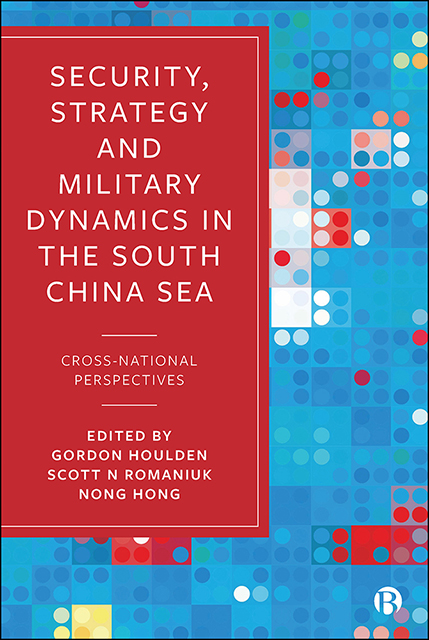Book contents
- Frontmatter
- Contents
- List of Tables
- Notes on Contributors
- Foreword
- Introduction: Strategic Challenges and Escalating Power Rivalry in the South China Sea
- 1 Between Competition and War: Complex Security Overlay and the South China Sea
- 2 The South China Sea as an Echo Chamber of Chinese Foreign and Security Policy
- Part I Claimants of the Contested South China Sea
- Part II Non-Claimants in Southeast Asia
- Part III Quadrilateral Security Dialogue States
- Part IV Non-Claimants in Europe and Eurasia
- Conclusion: Looking over the Horizon – Prospects for Settlement of the South China Sea Dispute?
- Index
8 - A Wary Warrior: Indonesia’s “Soft-Assertiveness” in the South China Sea
Published online by Cambridge University Press: 13 April 2023
- Frontmatter
- Contents
- List of Tables
- Notes on Contributors
- Foreword
- Introduction: Strategic Challenges and Escalating Power Rivalry in the South China Sea
- 1 Between Competition and War: Complex Security Overlay and the South China Sea
- 2 The South China Sea as an Echo Chamber of Chinese Foreign and Security Policy
- Part I Claimants of the Contested South China Sea
- Part II Non-Claimants in Southeast Asia
- Part III Quadrilateral Security Dialogue States
- Part IV Non-Claimants in Europe and Eurasia
- Conclusion: Looking over the Horizon – Prospects for Settlement of the South China Sea Dispute?
- Index
Summary
Introduction
The South China Sea (SCS) – a semi-enclosed sea – is one of the world's key shipping routes and richest fishing grounds. Shared by China, Vietnam, Malaysia, Singapore, Indonesia, Brunei, and the Philippines, the SCS also sees one third of global trade pass through its waters. The SCS is also known for its high economic value. It is rich with high value marine life, particularly demersal fish and tuna, and significant deposits of hydrocarbons trapped beneath the Kalayaan Island Group's (KIG) seabed. The overarching maritime dispute in this highly strategic locale involves six claimant states including China, Taiwan, the Philippines, Vietnam, Malaysia, and Brunei, with China representing the strongest of these countries in terms of its military capabilities. Although Indonesia is not a claimant state, as one of the coastal states of the SCS Indonesia has played and will almost certainly continue to occupy a central role in efforts to manage the conflict. Through its ongoing efforts to diffuse the conflict, Indonesia has engaged parties to the disputes primarily through the ASEAN-China Joint Working Group on the Implementation of the Declaration on the Conduct of Parties in the South China Sea and the Track 2 approach, namely the Workshop on Managing Potential Conflict in the South China Sea that Jakarta has organized since 1990.
In recent years the development of the multi-faceted dispute in SCS has raised serious concern among states about the potential escalation of the conflict, with experts assessing the possibility and probability that the dispute could turn into a hot war. Zheng Hao expressed that, “[a] close look at recent US military activities and China-US military relations would indicate that the SCS situation is moving towards the brink of conflict.” Oliana Skylar Mastro asserts that, “[i]t would be wrong to assume that China is satisfied with the gains it has made or that it would refrain from using more aggressive tactics in the future.” Referring to the Cold War and the improbability of war between the two superpowers starting in Central Europe, John Mearsheimer explained, “contrast that with the situation in East Asia, which is the central flash point between United States and China, the three places where you could possibly have a war involve the South China Sea, Taiwan and the East China Sea.”
- Type
- Chapter
- Information
- Security, Strategy, and Military Dynamics in the South China SeaCross-National Perspectives, pp. 151 - 178Publisher: Bristol University PressPrint publication year: 2021



